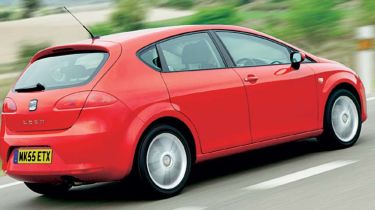SEAT Leon
With diesel prices averaging nearly £1 a litre, and hi-tech petrol cars proving almost as frugal as oil-burners, the argument for filling up from the black pump may be weakening.
We were impressed by the Leon in base petrol guise, but this is better. The 2.0 TDI is great value, and proves its worth in town and on the open road. Although the class's best all-rounder remains a Golf or Focus, few buyers will be disappointed by SEAT's latest diesel.
With diesel prices averaging nearly £1 a litre, and hi-tech petrol cars proving almost as frugal as oil-burners, the argument for filling up from the black pump may be weakening.
So are families still better off sticking with diesel? To find out, we took to the road with one of the latest derv engines available. Although previous-generation versions of the SEAT Leon had to make do with the long-standing 1.9-litre TDI, this stunning new variant comes with its more refined 2.0-litre successor.
In 138bhp guise, the unit propels the car from 0-62mph in 9.3 seconds, and has plenty of in-gear acceleration, thanks to its 320Nm of torque. The only drawback is the notchy gearchange and short first ratio. Otherwise, the engine gives the car the same sporty performance as the petrol versions, with well weighted steering and a sharp turn-in.
Harsh ride quality compromises the new Leon's long-distance comfort, but the handling is in a completely different league to that of its predecessor, and is almost worthy of a hot hatch.
At £16,495, the SEAT represents good value, too. It costs £1,325 less than VW's Golf 2.0-litre TDI GT, but opting for this engine adds £500 to the price of a petrol FSI turbo Leon. Other bonuses include economy of 50.4mpg and CO2 emissions of 154g/km, which will help to keep the bills down in the face of escalating fuel tariffs.
If you are considering a SEAT but have a tight budget for running costs, it's worth trying to stretch the cash to a diesel Leon. In this class, we would still recommend opting for an oil-burner.



